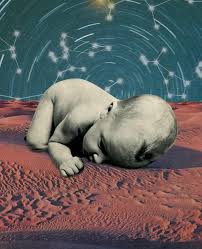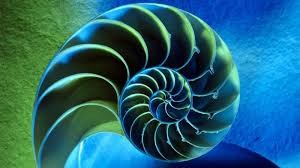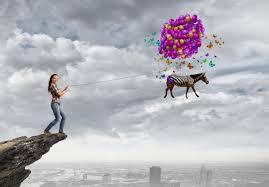Pretend that the present moment is like a wheel, with our concentration at the hub. To maintain what we think of as time momentum, the hub is connected by spokes to the exterior circular framework. Otherwise the hub alone would get us nowhere, and our “moment” would not even give us a bumpy ride.
Our journey through time, however, seems to go smoothly: The wheel rolls ever forward. It can roll backward as well, but in our intentness we have a forward direction in mind, and to go backward would seem to divert us from our purpose.
The forward motion brings us into the future, out of the past from which it seems we are emerging. So we plot a straight course, it seems, through time, never realizing in our analogy that the wheel’s circular motion allows us to transverse this ongoing road. The hub of the present, therefore, is held together by “spokes.” These have nothing to do with our ideas of cause and effect at all. Instead they refer to the circular motion of our own psyche as it seems to progress in time. Each present moment of our experience is dependent upon the future as well as the past, our death as well as our birth. Our birth and our death are built in, so to speak, together, one implied in the other.
We could not die unless we were the kind of creature who was born, nor could we have a present moment as we consider it. Our body is aware of the fact of its death at birth, and of its birth at its death, for all of its possibilities for action take place in the area between, Death is therefore as creative as birth, and as necessary for action and consciousness, in our terms.
It is not quite that simple, however, for we live in the midst of multitudinous small deaths and births all of the time, that are registered by the body and the psyche. Consciously we are usually unaware of them. Logical thought, using usual definitions, deals with cause and effect, and depends upon a straight sequence of time for its framework. It builds step upon step. It is woven into our language. According to logical thought and language we may say: “I am going to a party today because I was invited last week, and said I would attend.” That makes sense. We cannot say: “I am going to a party today because I am going to meet an individual there who will be very important to my life five years from now.” That does not make sense in terms of logical thought or language, for in the last example cause and effect would exist simultaneously — or worse, the effect would exist before the cause.
On all other-than-normally conscious levels, however, we deal very effectively with probabilities. The cells maintain their integrity by choosing one probability above the others. The present hub of the wheel, therefore, is but one prominent present, operationally valid. Cause and effect as we think of them appear only because of the motion, the relative motion, of the wheel in our analogy.
When our eyes are on the road of time, therefore, we forget the circular motion of our being. When we dream or sleep, however, the world of cause and effect either vanishes or appears confused and chaotic. Normal night-time images are mixed and matched, so that combinations are formed quite different from those seen in the daylight. The known rules that govern the behavior of creatures and objects in dreams seem no longer to apply. Past, present, and future merge in a seemingly bizarre alliance in which, were we waking, we would lose all mental footing. The circular nature of the psyche to some extent makes its known. When we think of dreams we usually consider those aspects of it only, commenting on perhaps upon the strange activities, the odd juxtapositions and the strange character of dream life itself. Few are struck by the fact of their dream’s own order, or impressed by the ultimate restrain that allows such sometimes-spectacular events to occur in such a relatively restricted physical framework.
For example, in a dream of 20 minutes, events that would ordinarily take years can be experienced. The body ages it’s 20 minutes of time, and that is all. In dreams, experience is peripheral, in that it dips into our time and touches it, leaving ripples; but the dream events themselves exist largely out of time. Dream experience is ordered in a circular fashion. Sometimes it never touches the hub of our present moment at all, as we think of it, as far as our memory is concerned; yet the dream is, and it is registered at all other levels of our existence, including the cellular.
We always translate experience into terms we can understand. Of course the translation is real. The dream as we recall it is already a translation, then, but an experienced one. As a language that we know is, dependent upon other languages, and implied pauses and silences, so the dream that we experience and recall is also one statement of the psyche, coming into prominence; but it is also dependent upon other events that we do not recall, and that our consciousness, as it now operates, must automatically translate into its own terms.






